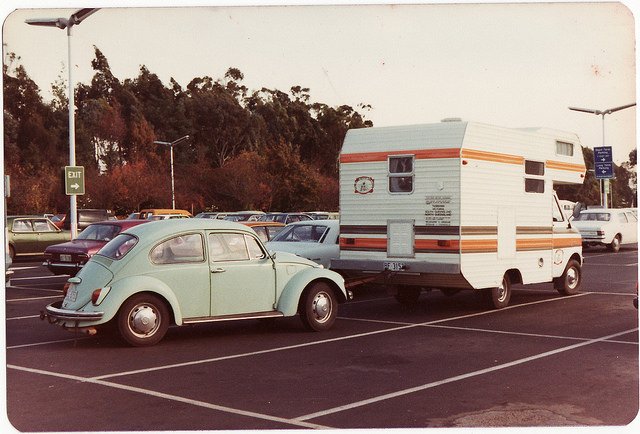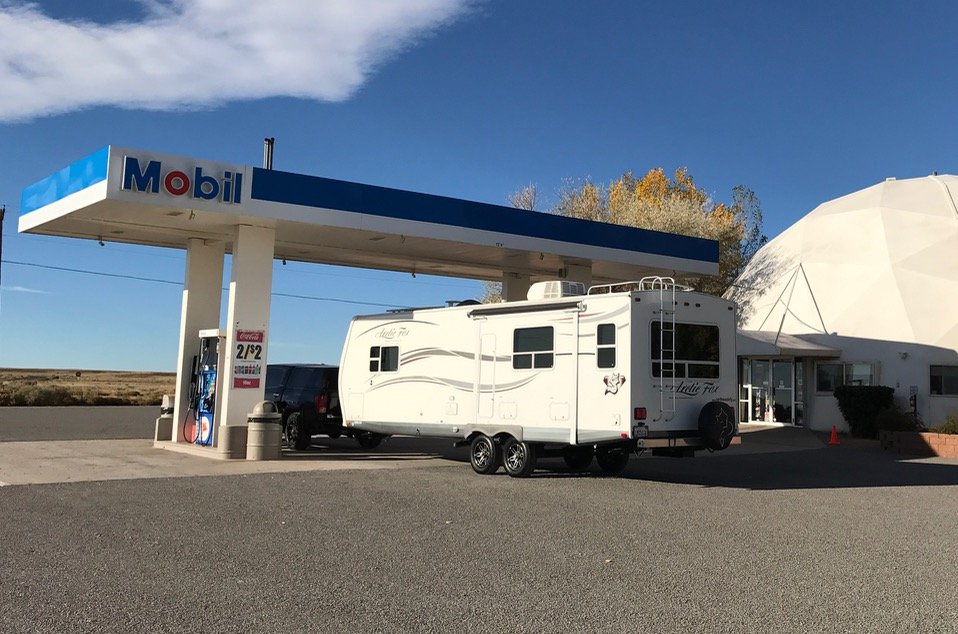Today I did some back-of-napkin math comparing carbon impact of RV life versus sticks-and-bricks life. I also found tons of really helpful details on Where-RV-Now?, which others will likely find more useful than what I’ve written here.
The Bad:

- I didn’t know trucks have worse CO₂ emissions per passenger-mile than jet airliners.*
- Add the trailer and it’s about twice as bad.
- Replacement tires add a lot more to the carbon footprint than they would for an urban commuter.
- A Class C motorhome (the kind with a van cab and a bed over the cab) towing a small car might have been smarter in hindsight.
* This changes if you have a big family in a heavy-duty diesel truck. I’m not going to put Athena’s paws on the scale to make this look better.
The Good:
- No commuting!
- RVers tend to use less day-to-day energy than traditional households.
The Great:
- Any energy I avoid getting from the grid, be it from propane, a cheap generator, or an expensive solar rig, emits far less CO₂ than Colorado’s majority-coal grid.
- Most of my appliances can run off of propane. (The propane heater also needs some electricity for the blower fan.) The only obvious consumption monster is the air conditioner.
- I currently can charge all my gadgets except my laptop off of solar, and the next laptop will be able to charge off solar via USB-C.
It looks like I’m on target for a significantly lower overall carbon footprint unless I’m moving locations all the time. Again, this is back-of-napkin, and my qualified engineer friends will know a zillion inefficiencies that complicate this.
Also, the napkin is made from hemp.

Living in an RV makes you intimately aware of every resource you use, water, sewer, heat, cooking, lighting, electric gadgets. You quickly learn to use just what you need, wasting nothing. You even tend to follow the weather so you can spend more time outdoors. You end up using lots less heating and cooling than staying in one arbitrary location all year round.
Andy Baird wrote a thoughtful review of this topic in his “Travels with Gertie” blog a few years back:
http://www.andybaird.com/Eureka/pages/saving-the-earth.htm
Seriously considering getting a light off-road trailer to pull with my Jeep. It’s pretty time-consuming to set up camp everywhere and might be nice for Zag to have a permanent-ish sleep spot. Probably will rig it with solar to charge my gear and keep the fridge cool. Not sure about showering, though. Might go the gym route for that.
I highly recommend this book if you haven’t got it already: https://www.amazon.com/Live-RV-Debt-Travel-Freedom-ebook/dp/B008S129XY/ref=sr_1_1?s=digital-text&ie=UTF8&qid=1483568832&sr=1-1&keywords=how+to+live+in+a+car+van
It’s short and goofy, but filled with great tips.
Something like a teardrop trailer with proper ground clearance could be a great match with a Jeep. I’ve also seen a lot of really cool pop-up tents that install directly on a Jeep roof.
My rig is only convenient while on the road in the sense that I can sleep in my own bed between semi trucks in a rest area- anything more stationary takes a good deal of setup and breakdown time. People in truck campers or vans/class B RVs definitely seem to have the most convenient setups by far. Since I can’t tow very far each day and setup/breakdown can take a while, I’m aiming for something where I stay put in each area for a while before hitting the road again.
And thanks for the book ref!
I looked at the rooftop campers, but the more I read, the more I didn’t want one. They aren’t super comfy (wind knocks them a bit) and it’s not always the easiest to get a Jeep level.